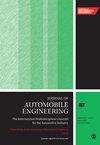Investigation of energy management strategy based on deep reinforcement learning algorithm for multi-speed pure electric vehicles
IF 1.5
4区 工程技术
Q3 ENGINEERING, MECHANICAL
Proceedings of the Institution of Mechanical Engineers Part D-Journal of Automobile Engineering
Pub Date : 2024-08-29
DOI:10.1177/09544070241275427
引用次数: 0
Abstract
With increasingly prominent problems such as environmental pollution and the energy crisis, the development of pure electric vehicles has attracted more and more attention. However, the short range is still one of the main reasons affecting consumer purchases. Therefore, an optimized energy management strategy (EMS) based on the Soft Actor-Critic (SAC) and Deep Deterministic Policy Gradient (DDPG) algorithm is proposed to minimize the energy loss for multi-speed pure electric vehicles, respectively, in this paper. Vehicle speed, acceleration, and battery SOC are selected as state variables, and the action space is set to the transmission gear. The reward function takes into account energy consumption and battery life. Simulation results reveal that the proposed EMS-based SAC has a better performance compared to DDPG in the NEDC cycle, manifested explicitly in the following three aspects: (1) the battery SOC decreases from 0.8 to 0.7339 and 0.73385, and the energy consumption consumes 5264.8 and 5296.6 kJ, respectively; (2) The maximumC-rate is 1.565 and 1.566, respectively; (3) the training efficiency of SAC is higher. Therefore, the SAC-based energy management strategy proposed in this paper has a faster convergence speed and gradually approaches the optimal energy-saving effect with a smaller gap. In the WLTC condition, the SAC algorithm reduces 24.1 kJ of energy compared with DDPG, and the C-rate of SAC is below 1. The maximum value is 1.565, which aligns with the reasonable operating range of vehicle batteries. The results show that the SAC algorithm is adaptable under different working conditions.基于深度强化学习算法的多速纯电动汽车能量管理策略研究
随着环境污染、能源危机等问题日益突出,纯电动汽车的发展受到越来越多的关注。然而,续航里程短仍然是影响消费者购买的主要原因之一。因此,本文提出了一种基于软行为批判(SAC)和深度确定性策略梯度(DDPG)算法的优化能量管理策略(EMS),以分别最小化多速纯电动汽车的能量损耗。选取车辆速度、加速度和电池 SOC 作为状态变量,并将行动空间设置为变速箱档位。奖励函数考虑了能耗和电池寿命。仿真结果表明,与 DDPG 相比,基于 EMS 的 SAC 在 NEDC 循环中具有更好的性能,具体表现在以下三个方面:(1)电池 SOC 分别从 0.8 降至 0.7339 和 0.73385,能耗分别为 5264.8 和 5296.6 kJ;(2)最大 C 率分别为 1.565 和 1.566;(3)SAC 的训练效率更高。因此,本文提出的基于 SAC 的能量管理策略收敛速度较快,并以较小的差距逐渐接近最佳节能效果。在 WLTC 条件下,SAC 算法比 DDPG 减少了 24.1 kJ 能量,且 SAC 的 C 率低于 1,最大值为 1.565,符合车辆电池的合理工作范围。结果表明,SAC 算法能适应不同的工作条件。
本文章由计算机程序翻译,如有差异,请以英文原文为准。
求助全文
约1分钟内获得全文
求助全文
来源期刊

CiteScore
4.40
自引率
17.60%
发文量
263
审稿时长
3.5 months
期刊介绍:
The Journal of Automobile Engineering is an established, high quality multi-disciplinary journal which publishes the very best peer-reviewed science and engineering in the field.
 求助内容:
求助内容: 应助结果提醒方式:
应助结果提醒方式:


